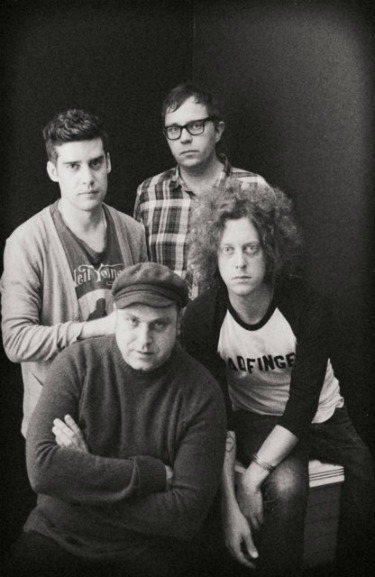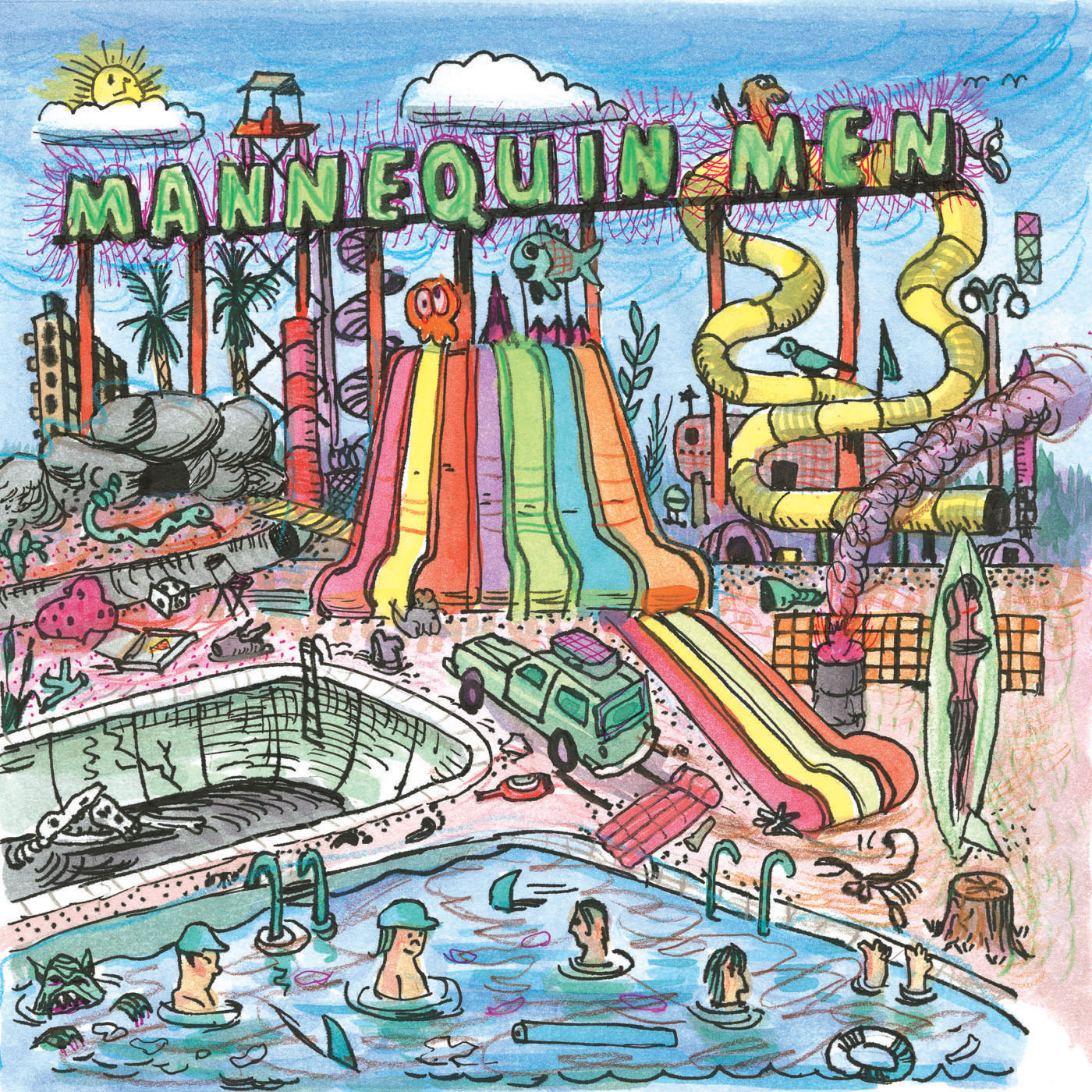INTERVIEW: Kevin Richard Of Mannequin Men
By Jon Graef in Arts & Entertainment on Nov 11, 2011 4:00PM
 Sooner or later, everyone grows up—even the merry pranksters in Mannequin Men. Fortunately for listeners, though, the Chicago rock quartet’s self-titled fourth album—released earlier this week—doesn’t forsake the band’s brand of basement-show tunefulness to the gods of maturity. Rather, it puts a new spin on the group’s excitable shows. (There’s even a Chamberlain organ, by god). Before the band’s tour in support of Mannequin Men kicked off, frontman Kevin Richard gave us a ring to chat about the new record.
Sooner or later, everyone grows up—even the merry pranksters in Mannequin Men. Fortunately for listeners, though, the Chicago rock quartet’s self-titled fourth album—released earlier this week—doesn’t forsake the band’s brand of basement-show tunefulness to the gods of maturity. Rather, it puts a new spin on the group’s excitable shows. (There’s even a Chamberlain organ, by god). Before the band’s tour in support of Mannequin Men kicked off, frontman Kevin Richard gave us a ring to chat about the new record.
Chicagoist: We’re going to jump ahead to the new record in a little bit, but now I want to talk about Lose Your Illusion, Too. That was one of the last records Flameshovel put out, right?
Kevin Richard: It was the very last, actually.
C: Can you describe what that situation was like from the band’s point-of-view?
KR: Yeah, it was really rough. The whole thing was a little strange. We’d gone through a personnel change with that record too. Miles [Raymer, bassist, and columnist for the Chicago Reader] had just joined, and we were still trying to get on our feet. We finished it, then before we released the record--we’re real good friends with Jesse and James from Flameshovel. They sat down with us and were like, ‘look, if you want to [release the album] with somebody else, we’ll give you the opportunity, because we don’t think we’re going to be [running the label] after this. We totally want to put out the record, but we don’t want to screw you guys over.’
And we were like, ‘well, you know, let’s go with it.’ The Touch and Go thing happened very shortly thereafter, and [the situation] was just a big mess on all accounts. No one’s really responsible for it, but there are so many more ways it could’ve gone better.
C: It seems especially tough because you’re friendly with them. It’s not like there’s some anonymous suit you can yell at for screwing things up.
KR: And we didn’t want to either, you know what I mean? It’s funny, too, because they took a chance on us when Fresh Rot came out. We were really green and didn’t know…we put our first record out ourselves. All of a sudden, they were like, ‘hey, we’ll pay for you to record and all of that stuff,’ and that was kind of a dream.
They were very responsible. They made that possible. I think it was easy for us at that point [before Flameshovel] to be like, ‘we’re doing all this hard work, and no one really notices.’ It was hard to bail on people like that. It wasn’t their fault. They were very good about letting us know and making sure it was an amicable situation. But yeah, it was a very uncharacteristic record for us, I thought.
C: In what way?
KR: I think it was very … it was really unfocused. It was a strange time. I think we were trying to find out what worked, or what didn’t, and a little bit of both happened on that record.
C: How is [Mannequin Men] different for you then?
KR: It was a more concerted effort to be a band, and actually work at being at a band. I feel an attachment to these songs - we all feel an attachment - that I didn’t before. I think it was a much more collaborative effort. I think that’s been really good for us, to have more people be in the game.
C: Was there a song in particular on Mannequin Men where this dynamic played out?
KR: I think the best example of that is probably “Hobby Girl,” which is the first single we put out for the record. It was a song that I had written and brought to the band with kind of no idea of what to do with vocal stuff. Seth [Eban] kind of took the idea and ran with it. Obviously, in my opinion, he nailed it. It couldn’t be any other way. That was one of those first moments where I think everyone wasn’t like, ‘oh, the song should be played this way.’ He just kind of took it and ran with it.
And it was awesome. That was a turning point. That song’s very uncool. It’s not fast, it’s not noisy, it’s just a straight up vocal. I think we did a better job of not seeing the end result, and just working on writing good songs. Hopefully, people will become attached to those songs in a different way.
C: How do you make sure that maturity isn’t synonymous with being boring, or being stuck in the same routine?
KR: I think that’s what freaked us out initially. None of us wanted to be mature. [Laughs].
C: [Laughs] So how do you make that big step then?
KR: I think that it’s just … you can’t fight it one way or the other. I think we’ve tried to not fight it one way or the other. It sucks to get all these reviews back that go ‘it’s their mature record,’ like I’m fucking Bono or something. [Laughs].
At the same time, I know these songs aren’t that mature. “Cheryl Tiegs” is about jacking off as a teenager, you know? There’s depth to the record. I would say that for sure. It’s not like we’re singing about the sunset of our lives and shit. It’s just about dudes who are bored of pretending that everything’s really, really cool all the time. We’re just writing songs about our lives.
C: In between your last two records, you see bands like Outer Minds, Radar Eyes, and, especially, the Smith Westerns gaining more recognition, locally and nationally. Do you guys feel like elder statesmen of Chicago garage-rock?
KR: I absolutely love Outer Minds. I think they’re one of the better bands to play in Chicago in ages. Same with Radar Eyes. I don’t either of them are garage-rock. They might be easier to associate with that scene just because of some of the members in the bands.
Garage-rock to me is that beginning, silly thing, where it’s the aesthetic and not songs. I feel like both of those bands have great songs. I’m really happy with the way Chicago is functioning as a music scene right now. I won’t include Smith Westerns in that just because I think they’re young, and weird, and ungrateful about it.
 C: They can come off that way in their interviews.
C: They can come off that way in their interviews.
KR: I just think it’s silly. And who’s to say if I were young and people were fawning all over me, that I wouldn’t say the same things? Sometimes when the voice of your band says some silly things, you all go down for it. I don’t know. I think they’ll do great. I hope they do well. It’s not like I wanna see them tank. But I don’t necessarily feel like they’re peers. I bet they’re having a shit load of fun though. [Laughs].
C: Is there anything else you wanted to add about the record? The cover art is really distinctive.
KR: Gary Panter did that. Collectively, he’s our favorite artist. He did the cover for Fresh Rot too, after I sent him a fanboy letter. He’s great. He’s been really good to us. One of the cooler parts in being in a band—getting to hang out with people you really admire.
Mannequin Men is out now. Listen to second single "Flying Blind" below:
Mannequin Men play December 3 at the Hideout, 1354 W Wabansia, 9 p.m., $10, 21+
See the full list of tour dates here